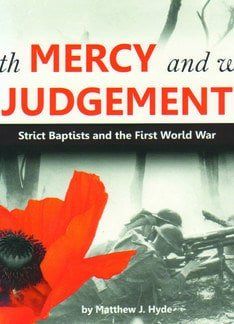Much attention is being paid to World War 1 and it is important to study its impact on Christians. The Strict Baptists were a relatively small denomination in 1914, but Dr Matthew Hyde’s study gives illuminating insight into the impact of the Great War upon these believers. He is also aware of the wider effects upon other denominations and does not limit his scope to ‘Gospel Standard’ Strict Baptists only.
Hyde has produced a fine piece of historical writing. It is well researched and abundantly illustrated with photographs. It includes many writings of those involved in the war, whether combatants or anxious relatives waiting and praying at home. I acknowledge a special interest. A few of my relatives are mentioned, as well as others I knew by name from childhood.
Much of the material was first published in denominational magazines, but some is drawn from original manuscripts. All is now brought together in a substantial volume which the serious student can work through while others could occasionally dip in. It is fully indexed, although some divisions such as people, places and subjects would have improved the index.
There is, however, a much wider interest. Historians describe the reverberations throughout the twentieth century following the loss of a generation of young men in the war. In this book, that loss is powerfully underlined. One reads of the Moon family, of Southborough, who lost their four eldest sons within a three-month period. John Booth, pastor of Zoar Chapel in Bradford, was about to enter his pulpit for Sunday worship when he received news that his son had starved to death while a prisoner of war.
This is an important book that deserves an enduring place among histories of that great conflict. It is not, however, negative in its presentation but lives up to its title. Prayers were answered, often in totally unexpected ways. People were sustained spiritually in unexpected situations. Believers and unbelievers alike suffered, but this book records many records of God’s grace.
Deprived as so many were of public worship and Christian fellowship, the Bible was ever a means of grace. So also were published sermons and hymns. Contemporary letters reveal the blessing gleaned from such hymns as John Ryland’s ‘Sovereign ruler of the skies, ever gracious, ever wise’.
Robert W. Oliver
Bradford on Avon




